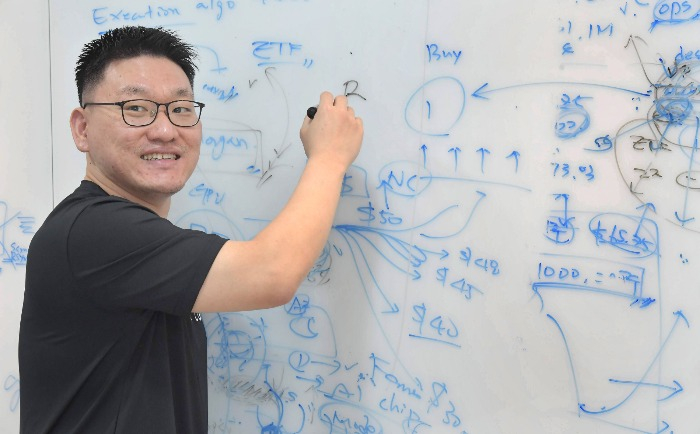Artificial intelligence
Ex-quant developer on a mission to save traders' microseconds
Within just a year of its founding, Rebellions Inc. has built a microchip that dramatically speeds trade
By Dec 06, 2021 (Gmt+09:00)
3
Min read
Most Read
EQT set to invest in KKR-backed fashion unicorn Musinsa


Geopolitics rewrite investment playbook – and that’s an opportunity: KKR


NPS gears up for investment overhaul with boost in risk assets


SK Group in talks with Hahn & Co. to sell SK Siltron


Glenwood PE to increase blind fund to $1 bn on pension funds’ interest



Prior to Rebellions Inc.'s new development, Intel's Habana Goya was the fastest AI accelerator in this field.
Rebellions' AI accelerator Ion, released last month, is 30% faster than Habana Goya when it comes to processing. Its electricity consumption rate is much lower than that of its Intel counterpart.
REACHING THE TOP IN JUST A YEAR
The company was founded in September 2020 by Park Sung-hyun, who used to work as a quant developer at Morgan Stanley in New York, with two partners. The chip they have developed helps to run artificial intelligence more efficiently, which cuts precious millionths of a second off the reaction times of automatic-trading machines.
Park says his former employer Morgan Stanley and JP Morgan have expressed interest in testing Ion, scheduled to be delivered to the companies soon. The official sale will begin next year, after some adjustments that reflect the clients' needs, he added.
Major financial institutes are mostly using NVDIA's GPU (graphics processing unit) A100, which can be used in many different industries.
What makes Rebellions' products unique is that it is customized for use in the finance sector; with faster processing, too.
It is also unheard of that a fabless company has introduced its first product in just a year after its launch. Taiwan's TSMC, the world's largest semiconductor foundry, is manufacturing the Ions.
WORLD-CLASS HUMAN RESOURCES
What really sets the company apart, however, is the manpower.
The company's impressive lineup is headed by the aforementioned founder and Chief Executive Park, formerly a developer at not only Morgan Stanley but also SpaceX, a US-based aerospace company headed by Elon Musk.
The company's Chief Technology Officer Oh Jin-wook previously designed AI chips at IBM and the Chief Product Officer Kim Hyo-eun developed deep learning technology at the AI medical device company, Lunit.
Rebellions also hired Kim Hyun-sook, a former chief researcher at Samsung System LSI, to enhance its software capability, as software design is as important as creating sound hardware to enhance AI chip performance.
Even before its first product was made public, Rebellions raised more than 3 billion won ($2,541,037) last year from investors including Kakao Ventures and Shinhan Capital.
Despite the passive success, the ex-quant says his company merely benefited from the best chip manufacturing environment in the world, created by Samsung and SK Hynix.
In fact, Samsung was the first to contact Rebellions for collaborations and the two will jointly build the startups' next AI chip Atom, to be used in data centers.
MAXIMUM AUTONOMY
Rebellions is consciously creating a work environment with maximum output; and does without middle managers and performance appraisals.
"Since every employee is an expert in his or her own field, they take care of business without reporting but with ownership," Park explained. "We don't restrict the entire staff's work environment just to catch one free-rider."
For maximum focus, there are no unnecessary meetings or researching for the sake of it, he added.
As speed is essential in this environment, as is with the product itself, there was no telecommuting during the pandemic. Park believes one should be able to communicate immediately and face-to-face when the need arises.
Rebellions plans to push out a new AI accelerator each year; Ion in 2021, Atom in 2022, and another one the year after. Even though there is not even a prototype for Atom yet, US tech giant Amazon has requested for collaboration.
Park told local media outlets that he plans to grow Rebellions as big as Korean conglomerate Samsung Electronics or US computer systems powerhouse NVIDIA.
Write to Joo-wan Kim at kjwan@hankyung.com
Edited by Jee Abbey Lee
More to Read
-
 Korean chipmakersSK Hynix bets on 3D HBM as next game-changer in AI chip race
Korean chipmakersSK Hynix bets on 3D HBM as next game-changer in AI chip raceApr 18, 2025 (Gmt+09:00)
-
 Tech, Media & TelecomSamsung fends off Apple to reclaim global smartphone crown in Q1
Tech, Media & TelecomSamsung fends off Apple to reclaim global smartphone crown in Q1Apr 17, 2025 (Gmt+09:00)
-
 Bio & PharmaCelltrion expands footprint in Latin America with flagship oncology drugs
Bio & PharmaCelltrion expands footprint in Latin America with flagship oncology drugsApr 17, 2025 (Gmt+09:00)
-
 AutomobilesKia EV3 named 2025 World Car of the Year; Hyundai Inster wins EV award
AutomobilesKia EV3 named 2025 World Car of the Year; Hyundai Inster wins EV awardApr 17, 2025 (Gmt+09:00)
-

Comment 0
LOG IN


